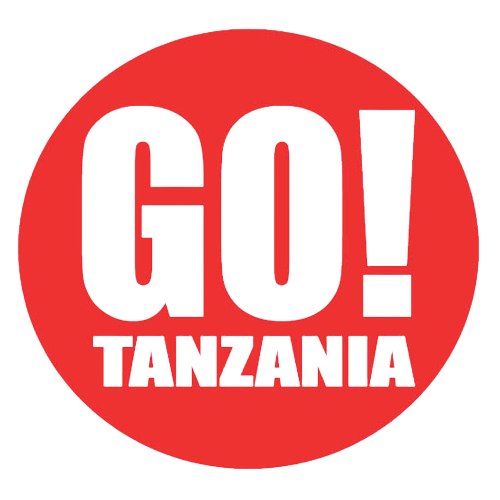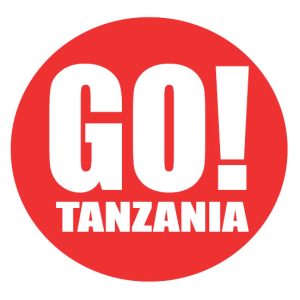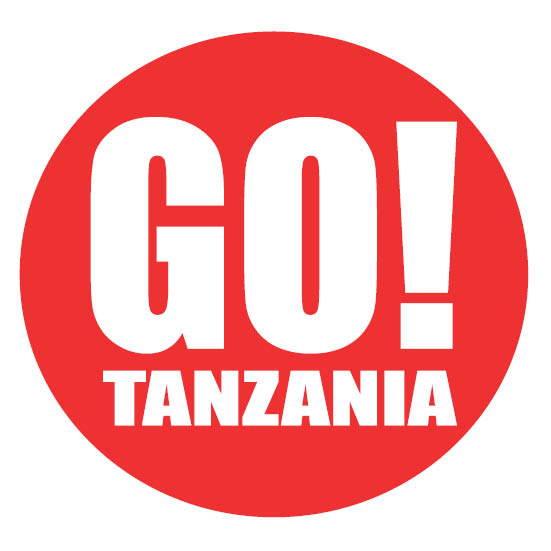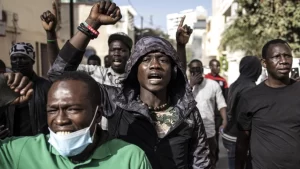Violent protests have roiled Senegal since President Macky Sall abruptly called off a planned election at the weekend, with just three weeks to go before the high-stakes vote. The crisis puts one of West Africa’s most stable democracies to the test at a time when the region faces democratic backsliding and a surge in military coups.
Senegal’s parliament voted on Monday to delay the country’s presidential election until December 15, two days after President Sall stunned the nation of 18 million people by calling off a planned February 25 vote.
The bill adopted by the National Assembly effectively extends Sall’s 12-year tenure, which was due to end on April 2. It was passed near-unanimously, with 105 votes in favour and just one against, after several opposition lawmakers were forcibly removed from the chamber.
Its passage came as police used tear gas to disperse protesters gathered outside the parliament building and as mobile internet services were suspended nationwide to counter the threat of “hateful and subversive messages on social media”.
The controversial move marks the first time a Senegalese election is postponed since the introduction of multi-party democracy in 1974. It has triggered fierce protests in the West African nation, seen as a democratic bastion of stability in a volatile region roiled by successive military coups.
‘Constitutional coup’
The decision to delay the vote, just hours before campaigning was officially set to begin, has exacerbated an already tense political climate, with Sall’s critics accusing him of cracking down on opponents and seeking to hold on to power.
In a televised address on Saturday, the president cited a dispute between the parliament and the country’s Constitutional Council over the disqualification of some candidates, arguing that this had created a “sufficiently serious and confusing situation” to justify delaying the vote.
His opponents, however, suspect the postponement is part of a plan to extend Sall’s term in office or influence whoever succeeds him. They claim he feared his chosen successor, Prime Minister Amadou Ba, was in danger of losing the election.
Opposition figure Khalifa Sall, who is not related to the president, denounced “a constitutional coup”, while two opposition parties filed a court petition challenging the election delay. The president’s announcement also sparked the immediate resignation of cabinet minister Abdou Latif Coulibaly, who expressed his dismay at Sall’s move.
“Maybe it’s just that when you’re in power, you think anything is possible,” Coulibaly told FRANCE 24’s sister radio station RFI. The president “cannot extend his term, it’s impossible”, he added.
Senegal’s democratic credentials now hang in the balance, said political analyst Gilles Yabi, head of the Dakar-based think tank Wathi, pointing to a constitutional crisis brewing.
“The situation is alarming because the Constitutional Council, which upholds the constitution and the separation of powers, has come under attack,” he said. “I fear we are entering a period of uncertainty and weakening of our institutions, starting with the one that is most important for protecting freedoms and the fundamental principles of democracy.”
Echoes of deadly unrest
Senegal’s political crisis has led to fears of the kind of violent unrest that broke out in March 2021 and June 2023, which resulted in dozens of deaths and hundreds of arrests.
The catalyst for the unrest was the arrest and later sentencing of opposition leader Ousmane Sonko in a rape case his supporters claim was politically motivated. Sonko and other prominent opponents have denounced a drift towards authoritarianism and accuse the government of manipulating the justice system.
In the run-up to the last presidential election in 2019, legal woes prevented opposition figures Khalifa Sall and Karim Wade from challenging Sall. Sonko was likewise barred from the forthcoming vote, though his back-up candidate Bassirou Faye is on the ballot.
Speculation that the incumbent might seek a third term in office, despite a constitutional two-term limit, had further stoked unrest, until he announced in July that he would not stand again.
“On April 2, 2024, God willing, I will hand over power to my successor,” Sall confirmed on December 31, in what should have been his final New Year address as Senegalese president.
Accusations of hanging on to power mark an ironic twist for the incumbent, who had led the challenge against his predecessor Abdoulaye Wade in 2012, arguing that the latter’s bid for a third term in office was unconstitutional.
“Sall himself had warned Wade that he could not stay one extra day as president,” said Yabi of the Wathi think tank. “Back then, he was very clear that any attempt to extend a mandate was contrary to the constitution.”
A ‘democratic model’ for the West
Sall eventually ousted Wade, his former mentor, in a run-off vote in 2012. Twelve years on, Senegal’s fifth president since independence prides himself on having transformed the country during his two terms at the helm.
Sall has introduced sweeping reforms and launched major infrastructure projects, including motorways, industrial parks and a new airport. He has also sought to position himself as a respected and influential player on the international stage, championing the respect of constitutional order even as a wave of military coups swept the region, toppling democratically-elected governments one by one.
His standing as the leader of a bastion of democracy in the region explains why Senegal’s international allies have expressed concern at the current crisis – but refrained from condemning Sall’s move.
As a “model of democracy”, Senegal is of extreme importance to the West, said Douglas Yates, a West African politics expert at the American Graduate School in Paris.
“American presidents visit Senegal precisely because it is a model of democracy,” he said. “And for France, it is one of the most democratic French-speaking countries left standing.”
In a statement on Monday, the US State Department said it was closely monitoring the situation in Dakar. It urged “all participants in Senegal’s political process to engage peacefully in the important effort to hold free, fair and timely elections”.
On Tuesday, West African bloc ECOWAS, of which Senegal is a key member, expressed its “preoccupation”, encouraging Dakar to “urgently restore the electoral timetable”.
Rights groups were more alarmist, with Human Rights Watch warning that the country’s status as “a beacon of democracy in the region (…) is now at risk”.
The advocacy group wrote in a statement: “Authorities need to act to prevent violence, rein in abusive security forces, and end their assault on opposition and media. They should respect freedom of speech, expression, and assembly, and restore internet, putting Senegal back on its democratic course.”
Despite the alarm, analysts have played down fears of a military takeover akin to the ones witnessed across West Africa in recent years. Senegal has never experienced a coup since gaining independence from France in 1960, making it a rare outlier in a troubled region.
“Coups are a real concern given the pattern in the region, but Senegal is a unique case,” said Yates. “It’s had three peaceful transitions of power. It’s a consolidated democracy. Elections really are the only game in town.”




